What Is UTMB?

UTMB, or the Ultra-Trail du Mont-Blanc, is Europe’s most famous ultramarathon, and it’s a bucket list race for runners all around the world.
Here’s all the most important information you need to know about UTMB. You can jump straight to different sections below.
What is UTMB?
UTMB is the ultimate European alpine ultramarathon. It begins and ends in Chamonix, France, and is a single loop circumnavigation of Mont Blanc covering over 170km (108 miles) with 10,000m of elevation gain as the race passes through France, Italy and Switzerland.
The route follows the Tour du Mont Blanc, which is one of the most popular and famous long-distance walks in Europe.
The original 170km race is known as UTMB and there are also several other races which take place over the course of what’s known as the UTMB World Series Final around Mont Blanc(more of the UTMB World Series here), including the 101km CCC and the 57km OCC. All three races are competitive and attract some of the world’s best ultrarunners as well as amateurs.
In 2024, the UTMB takes place from Monday 26 August to Sunday 1 September. It’s the 20th running of the UTMB which began in 2003 (with 2020 the only year that it hasn’t taken place – a break due to Covid-19 pandemic).
Runners have 46 hours and 30 minutes to complete UTMB. The men’s course record is held by American Jim Walmsley (19:37:43) and the women’s course record is held by American Courtney Dauwater (22:30:54).
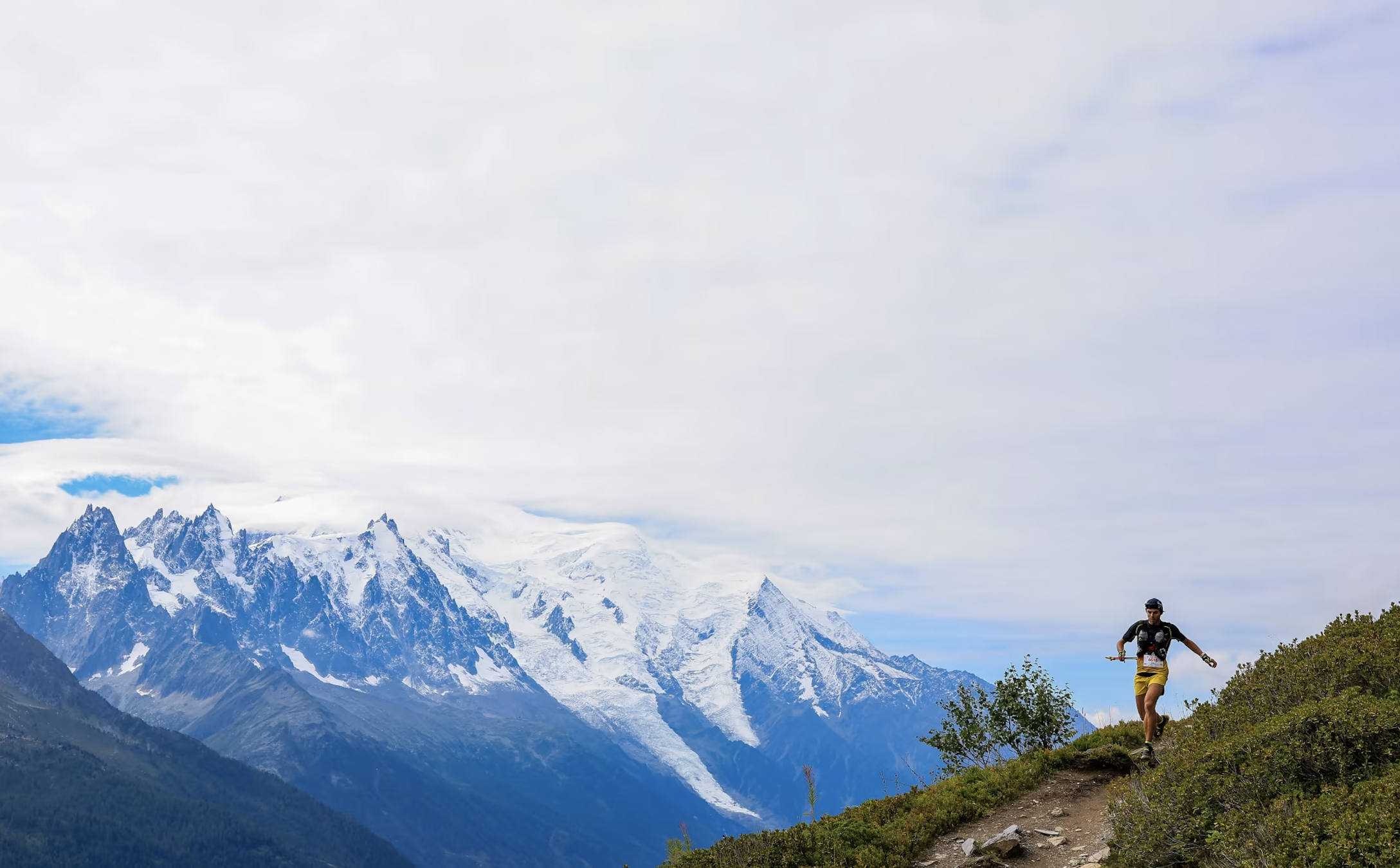
Why Is UTMB So Famous?
Despite only being run for the first time in 2003, UTMB has because the best-known European ultramarathon, and runners from all over the world dream of entering one of the main UTMB races – UTMB, CCC and OCC.
It’s fabled because of its a spectacular and incredibly challenging course which runs through three countries, with epic scenery, brutal climbs, many welcoming aid stations, and the promise of a celebratory atmosphere at the busy finish in Chamonix.
It adds the extra challenge of a 6pm start time, meaning at least one night of running, and probably two for most people, and potential extreme shifts in weather.
The start and finish in Chamonix has become iconic, especially the playing of Vangelis’s Conquest of Paradise which sends runners off into the mountains.
It’s featured in many great documentaries (this one featuring Jim Walmsley is one of the best), and every year photos and videos of the race reach millions of viewers. For those who love long distance running, it’s very inspiring.
And all of this calls runners to Chamonix to experience it for themselves.
All The UTMB Races
If you hear UTMB then typically it’s referring to the main 170km route, but over the years other races have been added to give some shorter (and one longer) courses for people to take on. In total, around 10,000 runners take part in races at the UTMB World Series Finals.
Here are all the races which are run during the week of UTMB. Apart from ETC, they all finish in Chamonix.
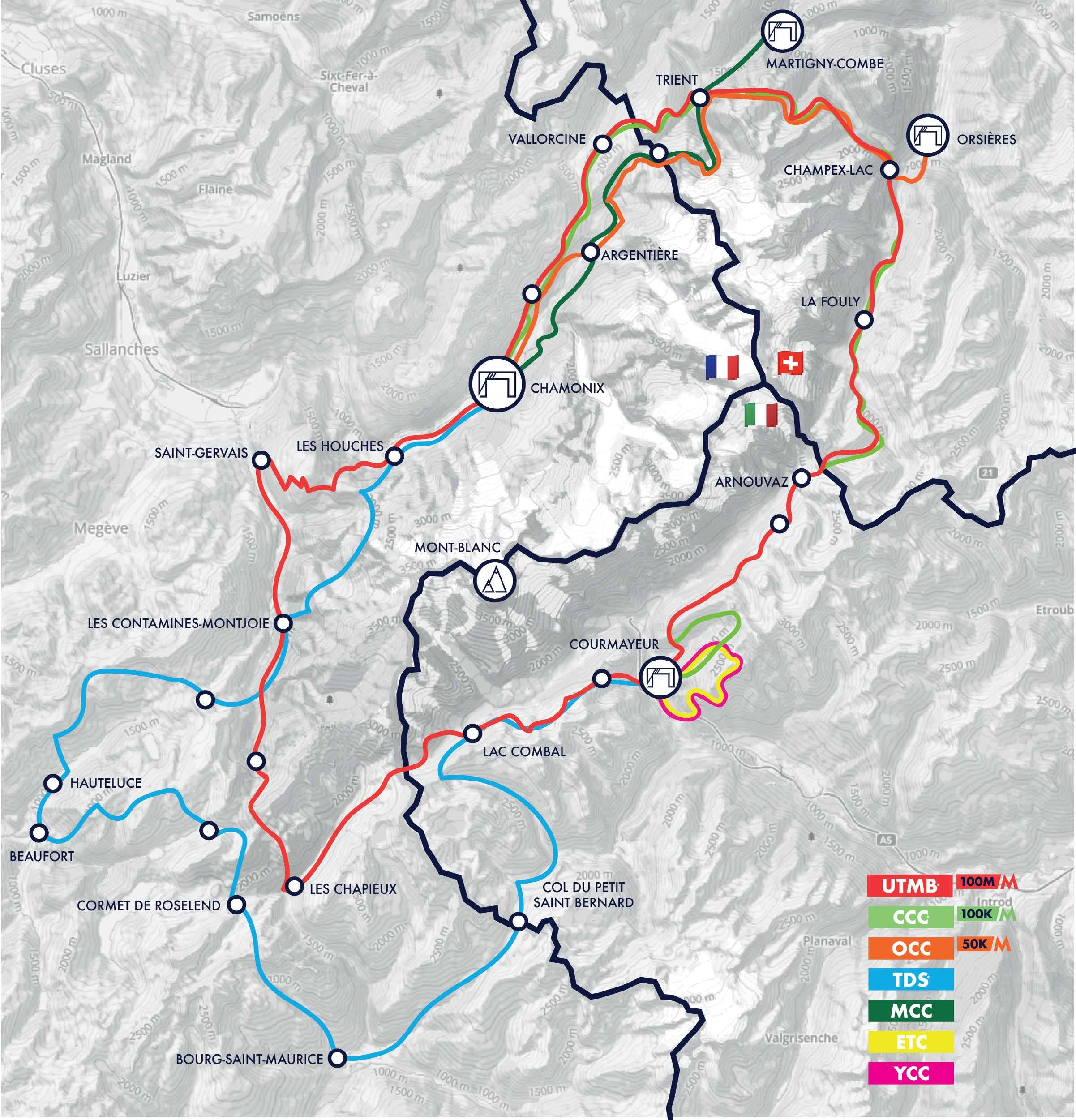
UTMB
WHAT: The UTMB. The main race covering over 100 miles and running anti-clockwise through three countries.
DISTANCE: 176km / 108 miles (elevation gain over 9,900m)
START: Chamonix, France
RUNNERS: 2,300
TIME LIMIT: 46:30
CCC
WHAT: Called UTMB’s ‘little sister,’ though there’s nothing little about this run! The name references three landmark towns on the route: Courmayeur, Champex-Lac, Chamonix.
DISTANCE: 101km / 63 miles (elevation gain 6,050m)
START: Courmayeur, Italy
RUNNERS: 1,900
TIME LIMIT: 26:30
OCC
WHAT: UTMB’s 50km, which begins in Switzerland, and takes its name from Orsières, Champex-Lac, Chamonix.
DISTANCE: 57km / 35 miles (elevation gain 3,500m)
START: Orsières, Switzerland
RUNNERS: 1,200
TIME LIMIT: 14:30
TDS
WHAT: A wilder and more challenging loop from Chamonix. The name is an abbreviation of ‘Sur Les Traces des Ducs de Savoie’ (‘Following the footprints of the Dukes of Savoie’)
DISTANCE: 148km / 92 miles (elevation gain 9,300m)
START: Courmayeur, Italy
RUNNERS: 1,600
TIME LIMIT: 44:10
ETC
WHAT: A challenging loop around the Italian Alps, named as Experience Trail Courmayeur.
DISTANCE: 15km / 9 miles (elevation gain 1,200m)
START: Courmayeur, Italy
RUNNERS: 1,000
TIME LIMIT: 4:30
MCC
WHAT: A race primarily for locals, volunteers and UTMB partners, but a great flavour of the UTMB experience. The name references Martigny-Combe to Chamonix.
DISTANCE: 40km / 24 miles (elevation gain 2,350m)
START: Martigny-Combe, Switzerland
RUNNERS: 1,000
TIME LIMIT: 10:00
PTL
WHAT: A ‘grand tour’ of Mont Blanc (with a sarcastic name of ‘Petite Trotte à Léon,’ or Leon’s Little Walk, named after Leon Louvey, a baker who organises the Champex-Lac section of UTMB). It’s for more adventurous runners who take part in teams of 2-3. It’s a different route each year and without course markings
DISTANCE: 300km / 186 miles (elevation gain 25,000m)
START: Chamonix, France
RUNNERS: 300 (in teams of 2-3)
TIME LIMIT: 152:30
YCC
WHAT: Two races for youth runners, with distances varying for different ages. The name mean Youth Chamonix Courmayeur.
DISTANCE: 15km / 9 miles (elevation gain 1,200m)
START: Courmayeur, Italy and Chamonix, France
The UTMB World Series
The UTMB brand has grown significantly in recent years, and now encompasses the UTMB World Series of 46 trail events held over five continents. Each event has several race distances, which are usually (but not always) around 100 miles, 100km, 50km and 25km.
Most races are the general UTMB World Series Events. Runners can collect Running Stones from all of these races (we explain the Stones below!).
There are three UTMB World Series Majors: Val D’Aran by UTMB in Spain, Canyons Endurance Run in California, and Chiang Mai Thailand by UTMB.
The UTMB World Series Finals are the races around Mont Blanc.
How Do You Enter UTMB
Amateurs need to enter a ballot to run one of the three main races – UTMB, CCC and OCC. To get into the ballot, you need to have significant experience in previous trail races and you have to have run at least one UTMB World Series race.
To enter the ballot you must have at least one Running Stone and have a valid UTMB index score.
Running Stones are earned from UTMB World Series races. Typically, a 100-mile race will earn four stones, with three for 100km, two for 50km and one for shorter races. Runners can collect their Running Stones and the more Stones you have, the better your chance of being successful. Running Stones have no expiry and you need to have collected at least one within the previous two years to enter UTMB. When you enter a ballot, you have to put in all your Stones (so you can’t just choose to use one and save the rest). If you are successful in the ballot, then your number of Running Stones reverts back to zero. In 2024, the average number of Stones for successful runners was five.
A valid UTMB Index means that runners have finished at least one UTMB index race within the past two years. To run the main UTMB race, runners have to have an Index from a 100-mile or 100km race. There are almost 3,000 races worldwide from which you can collect UTMB Index points (and over 250 in the UK). Running a UTMB World Series event will collect you an Index and Stones in the same race.
Elite runners can qualify based on good performances. The top three male and female runners in all UTMB World Series races of 100 miles, 100km and 50km are offered a place at the UTMB, and the top 10 runners in the UTMB World Series Majors get automatic places (though they all still need to pay for their race entry). Runners with a high enough UTMB Index score can also get an automatic qualification in their category.
Runners who finish in the top three at UTMB, CCC and OCC are also offered a place for the following year, as long as they collect at least one Running Stone in the intervening period.
The cost to run UTMB in 2024 was €398. CCC was €250 and OCC €155.
***
Is UTMB on your running bucket list?
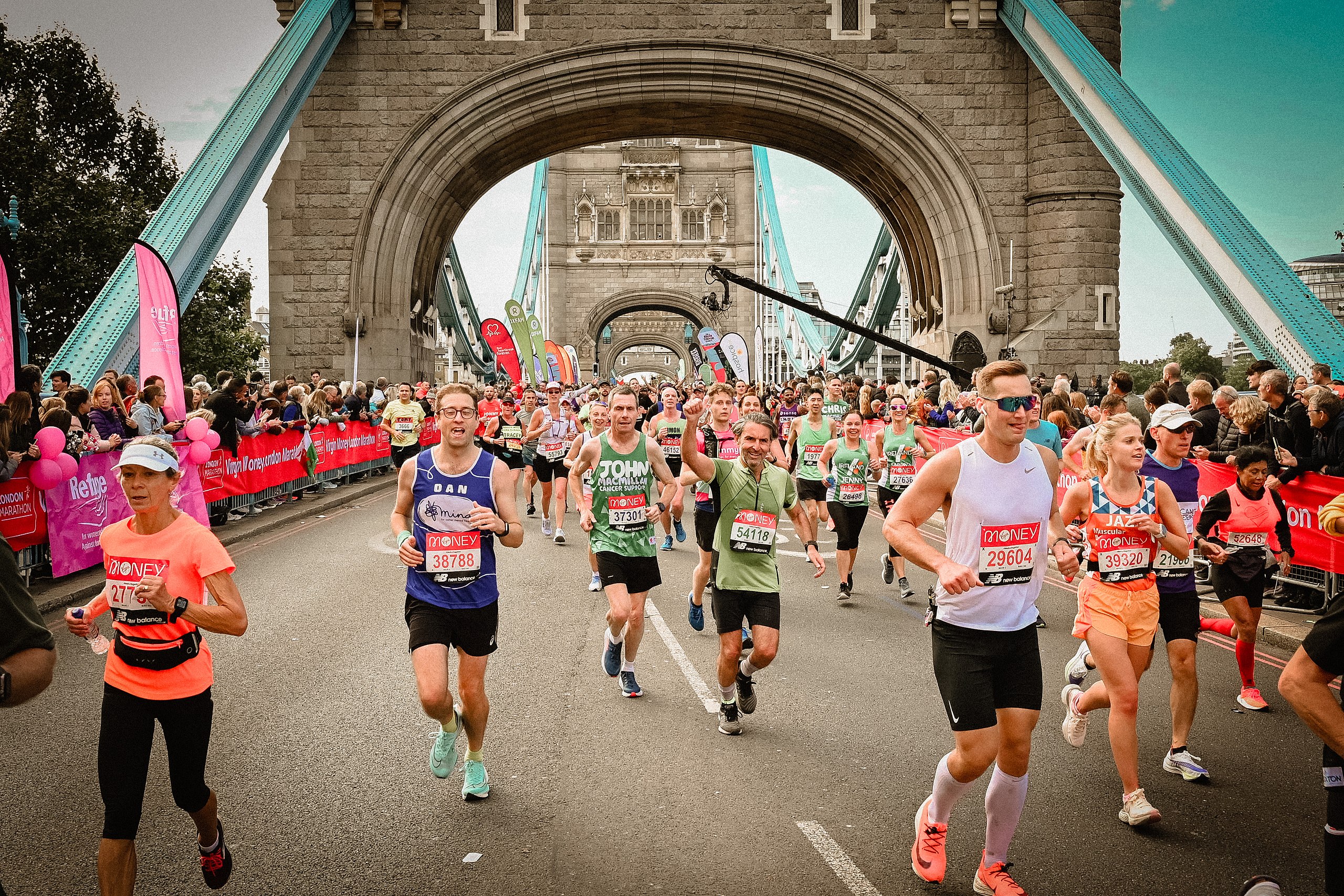


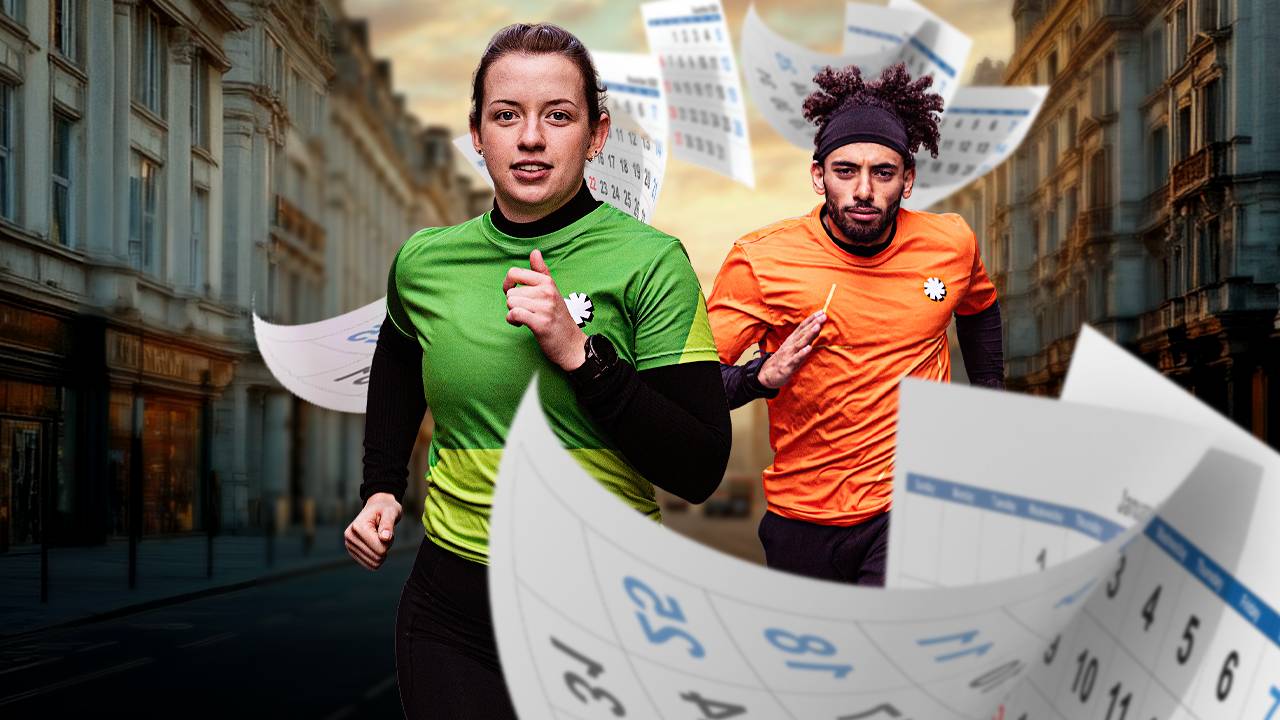
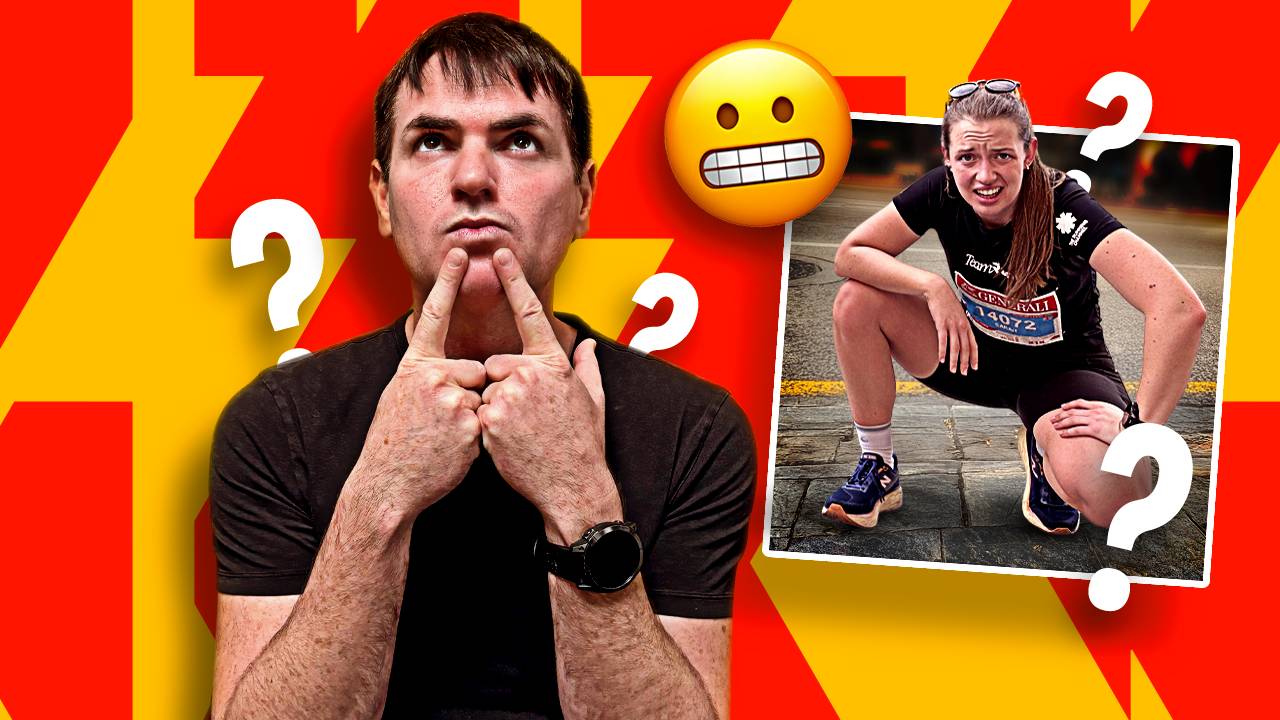






















Running News
Ingebrigtsen Stars at World Athletics Indoor Championships 2025 – Plus All The Winners!
Sam Ruthe Is First 15-Year-Old To Run A Four-Minute Mile!
Eliud Kipchoge Will Run The 2025 Sydney Marathon!